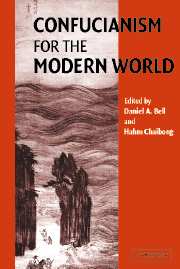Book contents
- Frontmatter
- Contents
- List of Contributing Authors
- Acknowledgments
- Editors' Note
- Introduction: The Contemporary Relevance of Confucianism
- PART I CONFUCIAN PERSPECTIVES ON DEMOCRACY
- PART II CONFUCIAN PERSPECTIVES ON CAPITALISM
- PART III CONFUCIAN PERSPECTIVES ON LAW
- 11 Mediation, Litigation, and Justice: Confucian Reflections in a Modern Liberal Society
- 12 Traditional Confucian Values and Western Legal Frameworks: The Law of Succession
- 13 The Confucian Conception of Gender in the Twenty-First Century
- 14 Family Versus the Individual: The Politics of Marriage Laws in Korea
- Epilogue: Why Confucius Now?
- Index
12 - Traditional Confucian Values and Western Legal Frameworks: The Law of Succession
Published online by Cambridge University Press: 28 August 2009
- Frontmatter
- Contents
- List of Contributing Authors
- Acknowledgments
- Editors' Note
- Introduction: The Contemporary Relevance of Confucianism
- PART I CONFUCIAN PERSPECTIVES ON DEMOCRACY
- PART II CONFUCIAN PERSPECTIVES ON CAPITALISM
- PART III CONFUCIAN PERSPECTIVES ON LAW
- 11 Mediation, Litigation, and Justice: Confucian Reflections in a Modern Liberal Society
- 12 Traditional Confucian Values and Western Legal Frameworks: The Law of Succession
- 13 The Confucian Conception of Gender in the Twenty-First Century
- 14 Family Versus the Individual: The Politics of Marriage Laws in Korea
- Epilogue: Why Confucius Now?
- Index
Summary
Whatever insights there are in the classic writings of Confucianism, the substantive content of Confucian values lies in their concrete and distinctive influences on political and legal institutions in society. Accordingly, the aim of this chapter is to consider how, in relation to the Law of Succession, Confucian values have been or could be given effect through concrete legal institutions that are comparable to those in established Western legal systems.
The law of succession provides a very good window through which to examine the impact of Confucian values, in that inheritance systems are often a function of family structures and cultural values in a society, and are often used by the state to encourage or discourage certain forms of relationships and behavior.
This chapter comprises two theses. The first, descriptive, thesis is to identify the extent to which existing succession laws in predominantly Chinese communities are the result of Confucian influence. It will seek to look for unique features in these laws that can only be justified by Confucianism. In the event that this strong claim cannot be established, it will also consider the weak claim as to whether such features can be said to have resulted from the influence of Confucian values on the minds of the legislators.
Accordingly, the laws in several predominantly Chinese communities will be compared to those of their Western counterparts, namely, those of the Western jurisdictions upon which the correspondent Chinese laws are closely based.
- Type
- Chapter
- Information
- Confucianism for the Modern World , pp. 288 - 311Publisher: Cambridge University PressPrint publication year: 2003



